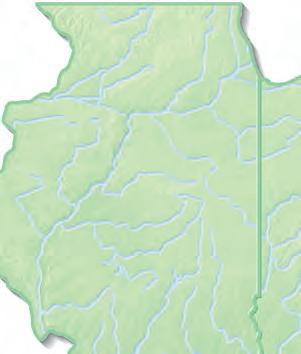A2 Friday, February 14, 2020
| INDIANA AGRINEWS | www.agrinews-pubs.com
Details of Indiana Farm Bureau’s health plan Who will benefit from INFB’s health benefit plans? NOBLESVILLE, Ind. — Members in all Indiana Farm Bureau has 92 counties who spent the past year redo not have acsearching how to resolve cess to group inexorbitant healthcare surance plans or costs that threaten farmwork somewhere ers’ livelihoods and even for health benefits their lives. such as farmers, Hall “Basically, we want to those who work offer something that’s on farms, agriinnovative, that provides business professionals and choice and that focuses rural entrepreneurs with on owner-operators that fewer than two employees don’t have employees,” or who do not qualify for said Katrina Hall, director significant Affordable Care of public policy, during Act subsidies. a breakout session at the Young Farmers and Ag Why not use an existing Professionals Conference option? in Noblesville. Through a year of ex“We’re getting into a tensive research of the whole new area of health healthcare benefit plans services that we really currently available, we haven’t focused on that have found there isn’t a much before. We’re creat- single option that creates ing a new company that significant savings for the will be the entity that will sole proprietor. do that, and it will be an Plans like the ones ofentity of Indiana Farm fered through the Indiana Bureau.” Chamber of Commerce About 80% of INFB benefit small businesses members are either sole with two or more employproprietors or operators ees. Since a vast majority with no employees, and of INFB members are sole the association health proprietors, they do not plans offered by other qualify for those types of organizations represent health plans. groups of employers and businesses, Hall said. What’s the legislative fix? “The plans that they For INFB to offer a offer in the statutory healthcare option for our framework that they are members, we need a statuusing wouldn’t work for tory change. The statutory us,” she explained. change will allow INFB Pending authorization to offer a non-insurance, by the Indiana General high quality and more Assembly, INFB plans to affordable health benefit partner with Tennessee plan to our members. Farm Bureau, which has offered a health benefit plan Why is it called a health bento its members for over 25 efit plan and not insurance? years. Iowa Farm Bureau Our solution creates a and, just last year, Kansas health benefit plan for our Farm Bureau have also pur- members. Since it will not sued a similar approach. meet all of the require“We believe that that ments under the ACA and using Tennessee Farm not all applicants will Bureau’s backend, which receive coverage due to is basically the adminiscertain preexisting conditrative part, the website tions, the solution we are part, and their experience pursuing can’t be called will help us get to market “insurance.” Importantly, sooner,” Hall said. the health benefit plan The goal is to be in the will function just like any marketplace by the end of other traditional health the year, she added. insurance plan. Hall provided answers to questions about INFB’s Will this plan impact the proposed alternative for health coverage marketmore affordable health place? care for rural families. INFB partnered with By James Henry
AGRINEWS PUBLICATIONS
HEALTH FROM PAGE ONE
“I know at the time there were a few votes that were borderline, and I think having people there telling their stories and having a show of the need helped push a few of them over to the yes side.” But this is only halftime, Kron stressed. A lot can happen — and still must happen — between now and the end of the legislative session, which w ill conclude March 11, he said. “We’re cautiously optimistic. We’ve had a lot of support. But it’s still a long ways to go,” Kron said. “We had a great grassroots effort in the Senate side. It’s going to take that and more on the House side,” he said. “It was impressive when the chairman of the insurance committee says, ‘Well, how many are here for Farm Bureau and this bill?’ Everybody’s hand went up in the room. I guarantee that has an impact when you do that. And then he’s like, ‘Well, there’s a bunch out in the hallway there, too.’ It will take that. They’ve got to see the need to be able to make this happen. “Call your state representative,” he said. “Have com mu nicat ions w it h them. You don’t have to get down in the details. Just say there’s a need, we need some more affordable choices.” Farmers are excited for INFB’s health benefit plan and have repeatedly asked Kron how soon it will be available. “I’m surprised by how many have told me they don’t even have insurance. There’s a real need out there,” he said. There are other options available, but they require two or more employees. A family farm doesn’t necessarily meet that requirement. “The farm community is a little unique in the way we operate,” Kron ex-
plained. “You think, well, these farms, they’ve got two or more employees, but I was talking to an individual the other day, it was the dad, himself and the grandson. You look at it and you think, oh, they’re a business, there are three employees. He told me, ‘Oh, no, we all work together, but we operate separately. We each have our own ground. We share equipment.’ “From appearance, you would look at it and think, oh, that’s a family, they’ve got three employees. But all three are sole proprietors, and that’s what we’re finding in agriculture. There’s a lot of that out there.” INFB is not replacing or taking away anything that is available now. It is just trying to bring another option to the market that is more affordable, Kron said. “In my four years as serving as president, seldom do I go to a meeting that somebody and the conversation on the side doesn’t turn to health costs or health insurance and how it’s affecting their farms,” he said, citing a woman who told him at the Statehouse that the monthly health insurance premiums for her and her husband and 4-month-old child cost more than her mortgage. “Generally, the conversation is ‘I can’t afford it’ or ‘there are problems, it’s affecting our bottom line.’ Somewhere in there it turns to, ‘Can’t Farm Bureau do something to help us?’ We’re going to try.” But INFB leadership cannot do it alone. “The grassroots, our members, are going to be key to this passing. I can’t stress that enough,” Kron said. “What worries me is the vote in the Senate looks really good. So, you can think, oh, it’s done. It’s not. It’s not going to be an easy lift. Don’t take your foot off the gas now, please.” James Henry
Lewis & Ellis, a nationally respected actuary firm, to analyze the impact on the marketplace. They concluded that our plan would have a minimal impact, accounting for only a 0.1% to 0.2% premium increase for those in the marketplace. Because our health benefit plans are targeted to address a gap in current offerings, the number of Hoosiers who would be looking into products like these would be somewhat limited. What would INFB’s health benefit plan cover? Our health benefit plan will be very robust, allowing members to choose the coverages they need. Our associates will work with our members to ensure their individual needs are met and they understand their coverages. Through a third-party administrator, we’ll be able to offer plans that feature many essential health benefits — including, but not limited to: n Office visits. n Hospitalization and tele-medicine. n Prescription drug benefits. n Preventative, routine and wellness services. n Maternity, newborn and pediatric care. n Outpatient services. n Mental health and substance abuse counseling and treatment. n Emergency room services. n Dental and vision coverage. n Rehabilitative services and devices. n Laboratory services.
The health plan we are proposing would become a benefit available to Indiana Farm Bureau How will INFB create a more members. Defining who is a farmer is a judgment call affordable healthcare opand could leave out agrition? business professionals and Since each applicant other small businesses will be individually rated that support farmers and based on their medical history, INFB will be able rural economies. Limiting those who could to offer coverage for significantly less than similar join Farm Bureau or who could buy the proposed coverage under the ACA healthcare benefit would where premiums are not also limit the size of the subsidized. pool of lives covered and Will members be denied cov- limit the ability of those in the pool to share risk. erage? Our goal is to cover Why not cover everyone? as many members as Our solution will help possible. To create a many of our members, health benefit plan that but will not address every is more affordable, some individual healt care need. applicants may not qualOur members stressed the ify for INFB’s plan. In importance of cost savings Tennessee, for example, throughout this process. nearly nine out of 10 apWithout cost savings of plicants receive coverage. individual underwriting, Could any Indiana Farm Bureau we wouldn’t be able to member take advantage of this offer something substantially different than what is health benefit plan? of the pool of a particular plan changes or as the individual ages.
on the market today. This innovative approach will create substantial savings for many of our members. What are the advantages to the Indiana Farm Bureau health benefit plan compared to other non-traditional health coverages? Our health benefit plan will function like any other traditional health benefit plan. Plans will include premiums and deductibles. Most importantly, it is a legally binding contract outlining specific coverages based on individual health conditions at the time of application. Indiana Farm Bureau is at its core an organization designed to serve our members’ needs. All of our plans will have clearly defined consumer protection provisions. James Henry can be reached at 815-223-2558, ext. 190, or jhenry@ agrinews-pubs.com.
What happens if a member gets sick? Will I lose my coverage if I get sick? Once members are accepted and pay their premiums they will not be denied coverage as long as they continue to be an INFB member. Similar to traditional healthcare plans, premiums may increase as the performance
Tavium has arrived. With lasting residual control, time’s up for tough weeds.
Tavium® Plus VaporGrip® Technology herbicide controls weeds in soybean fields with the powerful combination of dicamba and S-metolachlor. It’s the first dicamba premix that controls both pre- and post-emergent weeds for up to 3 weeks longer than dicamba alone. Meaning it helps keep fields free of weeds until your soybeans grow to canopy. Talk to your local Syngenta retailer or visit SyngentaUS.com/Tavium to learn more.
©2020 Syngenta. Important: Always read and follow label instructions. Some products may not be registered for sale or use in all states or coun ties. Please check with your local extension service to ensure registration status. Tavium Plus VaporGrip Technology is a Restricted Use Pesticide. For use by certified applicators only. Tavium,® the Alliance Frame, the Purpose Icon and the Syngenta logo are trademarks of a Syngenta Group Company. VaporGrip® is a registered trademark of, and used under license from, Monsanto Technology, LLC. MW 0TAV01902-Soy-AG222 12/19















